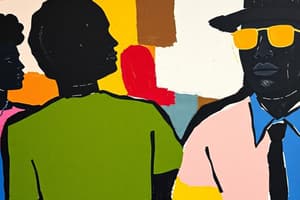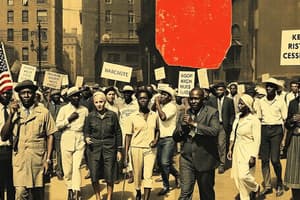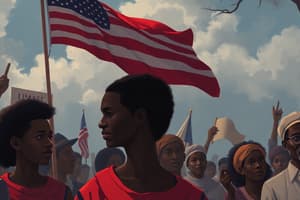Podcast
Questions and Answers
What was the response to the arrest of Rosa Parks in 1955?
What was the response to the arrest of Rosa Parks in 1955?
Montgomery Bus Boycott
Which event included Martin Luther King Jr.'s famous 'I Have a Dream' speech?
Which event included Martin Luther King Jr.'s famous 'I Have a Dream' speech?
March on Washington
What was the goal of the Freedom Riders who traveled throughout the American South in 1961?
What was the goal of the Freedom Riders who traveled throughout the American South in 1961?
Challenging segregation laws
Where did the Greensboro sit-ins take place and what was the main form of protest?
Where did the Greensboro sit-ins take place and what was the main form of protest?
Who were the Little Rock Nine and what was significant about their enrollment in 1957?
Who were the Little Rock Nine and what was significant about their enrollment in 1957?
What were Jim Crow laws?
What were Jim Crow laws?
What was the significance of Brown v. Board of Education?
What was the significance of Brown v. Board of Education?
Who led the Montgomery Bus Boycott?
Who led the Montgomery Bus Boycott?
What did the Montgomery Bus Boycott aim to achieve?
What did the Montgomery Bus Boycott aim to achieve?
How did the Montgomery Bus Boycott impact the Civil Rights Movement?
How did the Montgomery Bus Boycott impact the Civil Rights Movement?
Flashcards are hidden until you start studying
Study Notes
The United States Civil Rights Movement: A Quest for Equality
The American civil rights movement, spanning from the mid-20th century to the present day, aimed to secure equal rights for all citizens, regardless of their race, color, religion, or national origin. This journey was marked by numerous milestones that challenged and ultimately overturned segregationist policies and practices.
Jim Crow Laws
Jim Crow laws were a network of state and local statutes enacted between the late 19th and early 20th centuries that mandated legal segregation in the United States. These laws imposed harsh restrictions on the lives of African Americans, limiting their access to public facilities and opportunities. Jim Crow laws solidified the de facto caste system of segregation known as "Jim Crow," which was a system of social control that suppressed Black citizens and maintained white supremacy.
Brown v. Board of Education
The pivotal Supreme Court case of Brown v. Board of Education (1954) ruled that the segregation of public schools was unconstitutional. The decision declared that "separate but equal" education, a principle established by the 1896 Plessy v. Ferguson case, was inherently unequal and unjust. This landmark case was a significant step towards dismantling Jim Crow laws and fighting for equal educational opportunities for all.
Montgomery Bus Boycott
The Montgomery Bus Boycott, led by Martin Luther King Jr. and the Montgomery Improvement Association, was a civil disobedience campaign that began in 1955. The boycott was a response to the arrest of Rosa Parks, a Black woman who refused to give up her seat to a white passenger on a city bus. The boycott lasted for 381 days and ultimately led to the desegregation of buses in Montgomery. This boycott proved that nonviolent direct action could challenge and defeat segregation.
Bus Boycotts
Beyond the Montgomery Bus Boycott, bus boycotts were a common form of protest used by civil rights activists. These boycotts were effective in bringing public attention to the injustices of segregation and in pressuring local governments to desegregate public transportation systems.
The March on Washington
The March on Washington for Jobs and Freedom, held in 1963, was a massive demonstration in support of civil and economic rights for African Americans. The march culminated with Martin Luther King Jr.'s famous "I Have a Dream" speech, which is recognized as one of the most significant and powerful speeches in American history. The march was a pivotal moment in the civil rights movement, drawing attention to the ongoing struggle for equality and providing a platform for voices of change.
Freedom Riders
Freedom Riders were a group of civil rights activists, both Black and white, who traveled throughout the American South in 1961 challenging segregation laws. The Freedom Rides sought to put into practice the Supreme Court's ruling in Boynton v. Virginia (1960), which declared that segregation in interstate transportation facilities was unconstitutional. Freedom Riders faced violence and intimidation from white supremacists, but their courageous actions helped to expose the injustices of Jim Crow and to push forward the cause of equality.
Greensboro Sit-ins
The Greensboro sit-ins, which began on February 1, 1960, were a series of nonviolent protests against segregation in public accommodations. The sit-ins were led by four African American college students, who staged a peaceful protest at a Woolworth's department store lunch counter. The sit-ins served as a catalyst for a wave of student activism and helped to mobilize a new generation of civil rights leaders.
Little Rock Nine
The Little Rock Nine were a group of African American students who, in 1957, enrolled in Little Rock Central High School, making them the first Black students to attend the previously all-white school. Their admission was met with violent resistance, but the Little Rock Nine's courage and persistence helped to open the doors of opportunity for future generations of African American students. The Little Rock Nine's struggle was a stark reminder that the fight for equal education was far from over.
The United States civil rights movement was a long and arduous journey, marked by triumphs and setbacks, but ultimately resulting in significant gains for equality, justice, and human dignity. This movement continues to inspire and shape the ongoing struggle for a more just and equitable society.
Studying That Suits You
Use AI to generate personalized quizzes and flashcards to suit your learning preferences.




